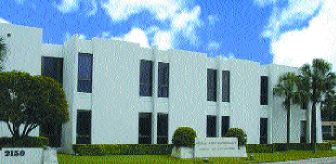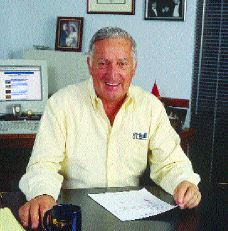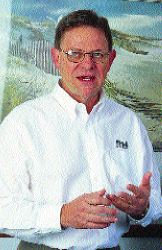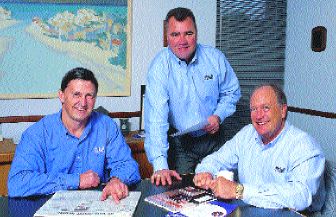

Chris Hull is vice president of business development for Hull & Company, Inc., which recently had a "banner year" in terms of acquisitions.
Chris Hull, vice president of business development for the Fort Lauderdale, Florida-based Hull & Company, Inc., believes that the surplus lines business in the United States is "greatly under-appreciated." He likes to compare surplus lines to lion taming. "You can't throw a lion into a cage full of pussycats and expect it to be handled in the same way," he says. "It is basic that a risk that has a high loss profile, or is esoteric or unique in nature, has no business being grouped with risks that do not have a higher loss potential or that are vastly similar in nature. That one risk can force anything from increased premiums on the whole group to financial instability for the carrier. These situations negatively affect the consumer. Surplus lines allows those risks to be handled in a way that can help the particular insured while protecting the larger group. We (surplus lines agencies) are the lion tamer of the industry, utilizing our skills, creativity and freedom to control the lion and protect the pussycats."
Hull & Co., which was founded by Chris' father, Richard Hull, will celebrate its 40th anniversary next year. It is privately owned and, in addition to its home office and five branches in Florida, has 11 branch offices in eight states -- Texas, California, North Carolina, South Carolina, Nebraska, Hawaii, Montana, Washington and Colorado. Although these are Hull's primary geographic areas, the firm is also active as a managing general agency (MGA) and wholesale broker in other states.
Mike Riordan, executive vice president, says that the lines of business that the firm is engaged in are numerous and varied. "We write monoline property and general liability and package policies for habitational risks such as hotels, motels, apartment complexes, mercantile risks, coastal/catastrophe exposed property, contractors, product risks and much more. Hurricane Andrew, which struck in our back yard, thrust us into the forefront of the Florida homeowners market. Now we write a significant book of homeowners and related coverages in Florida and the Carolinas and we're expanding our success in those states to others such as Texas, California and Colorado," says Mike.
In addition, Hull writes commercial auto--livery and intermediate and long-haul exposures.

"Hull has always been known for our marine products," says Mike. "We write boats, yachts, personal watercraft, marinas, marine contractors and products, boat repair yards and marine excess. Partly because of our name and partly because we tend to be somewhat 'low key,' many people assume it's all we do. In fact, while it's an important piece of the puzzle and we do a lot of it, it represents only around 5% of our total premiums."
Professional liability is another area to which Hull has made a commitment, according to Mike. "Our branches have written miscellaneous errors and omissions and directors and officers for years, but until recently we have never had a team that could innovate new solutions and get us into this business in a way that would add significant value to our customers. We do now. Future, and current plans call for significant growth in this area."
 Hull & Company, which is based in Fort Lauderdale, Florida, will celebrate its 40th anniversary next year.
Hull & Company, which is based in Fort Lauderdale, Florida, will celebrate its 40th anniversary next year.
And growth seems to be high on the agenda for Hull & Co. Bill Simons, senior vice president and chief financial officer, says the year 2000 was a "banner year" for acquisitions by the firm. Two major acquisitions were completed: All American Agency Facilities of Denver and Unamark Underwriters of Fort Lauderdale. "These added many talented people and several key new markets to the Hull arsenal. Our philosophy on acquisitions is to buy those MGA wholesalers that can contribute to our bottom line and that can work with our culture. We are looking for self-starters who want to focus on growing their business, not managing the minutiae of accounting or human resources or any of those functions we can easily handle from our home office," says Bill. "We will continue our aggressive posture on mergers and acquisitions into 2001."
Another executive of Hull, Bob McGrew, senior vice president, sees today's insurance marketplace as "a very exciting one at this point in time, filled with challenges, opportunities and, yes, even some potential pitfalls for those who don't move with the changes taking place in the industry. There are changes on the regulatory front unlike any that have taken place before," he says. "Moreover, for the first time in 15 years we're seeing a hardening of the marketplace. There will be a good deal of rate increases, not in every class, but the cumulative effect will be a positive upward adjustment that, hopefully, will put the markets back on solid ground. As hard as that is to sell, it's in the best interests of all of 'us' consumers to have a financially stable marketplace. In addition, some of the more exotic risks (the lions) that moved into the standard market during the soft market period will be moving back into surplus lines."
Is there a danger that some corporate buyers of insurance, rather than pay higher premiums to the traditional insurance marketplace, might take advantage of their existing captives, form new ones or establish risk purchasing groups? "That's certainly a possibility," says Ed Calabrese, senior executive vice president of Hull. "But our business is not just about selling insurance. We've always worked hard at providing solutions to our customers' problems within the confines of the products we manage or that we have access to in the open market. We have recognized the need to stay in step with the evolution of the insurance marketplace in terms of being innovative.
"Two prime examples are a risk purchasing group we created for real estate agents in the Southeast, which is slated to expand nationwide, and a Medicaid reimbursement program designed to keep doctors in business while they are being investigated by the government for perceived irregularities in their billing. A number of these new programs are in various stages of development."
 Ed Calabrese emphasizes that by keeping in touch with the evolving insurance marketplace, Hull can provide innovative solutions to its customers' problems.
Ed Calabrese emphasizes that by keeping in touch with the evolving insurance marketplace, Hull can provide innovative solutions to its customers' problems.
Another challenge facing the insurance business is the, as yet, untested financial services deregulation law that was passed in December of 1999, says Hull's Bruce Bowers, also senior vice president. "There's a good deal of uncertainty in the marketplace as to how the act will affect the business of insurance. Every state regulatory department, every company has a different take on the law and what it means. We're going to our companies and asking for their guidance on how they want us to deal with the law. We represent some 100 companies, and for about
25 of them we are an active managing agent. We have to know what they want us to do, as we are basically responding on their behalf. Some companies have their strategies set; others are still studying the law. So everything is still up in the air," says Bruce.
For example, continues Bruce, under the law the question of uniformity of agent licensing remains unanswered. "If the states don't agree on uniform licensing laws, then the federal government might step in. That would draw a good deal of money away from state tax coffers. If that happens, then what would happen to state guaranty funds? Right now, nobody knows for sure."
 "Hull has always been known for our marine products. ... Partly because of our name ... many people assume it's all we do. In fact, ... it represents only around 5% of our total premiums."
"Hull has always been known for our marine products. ... Partly because of our name ... many people assume it's all we do. In fact, ... it represents only around 5% of our total premiums."
--Michael J. Riordan, Executive Vice President, Hull & Company, Inc.
As for the potential new competition in the insurance business coming from banks that are now allowed to sell insurance under the new law, Chris Hull does not appear overly concerned. "We haven't seen as much in the way of competition as we have in the way of opportunity," says Chris. "We do business with bank-owned agencies--many were our independent customers who were purchased--and are constantly looking for ways to align our products and services with their needs. Surplus lines represents about 5% of the total U.S. insurance market. That doesn't lend itself well to the kind of broad business model the banks are trying to implement. It is a specialty area that we've been working in for 40 years. I see the banks more interested in partnering than in trying to learn it and conquer it."
On the international scene, Hull & Co. does a good deal of business with the London market, particularly Lloyd's of London. The Lloyd's market, primarily because of the litigation it has faced in recent years, has undergone serious changes, the most important of which is the dominance of corporate capital in the marketplace. In years past, corporate insurance companies tended to walk away from risks when Lloyd's underwriters remained innovative and looked for ways to take on more exposures. Will corporate capital change the way Lloyd's operates? Chris hopes not.

"Lloyd's has always had a reputation of being creative and responsive," he says. "I worked in the London market for about four years and I was able to bring in some 'unusual' risks and still get a quote. There is no question that today there is more accountability on the part of Lloyd's underwriters, accountability to internal and external regulation and to the corporate capital they represent, and that's a good thing. But the concern is, and what Lloyd's has to be careful of, is the possibility that corporate mentality might spoil the very thing that makes Lloyd's a great market--creativity."
Finally, with all the emphasis today on new technologies and the Internet, where will the wholesale distribution system fit into the grand scheme of things? Says Chris: "People look at the wholesale distribution system and wonder about its viability. What they don't realize is that the costs involved in researching and developing new products, marketing to a geographic area as vast as the one in which we operate and processing the business in numerous states--not to mention the complexities of underwriting and rating surplus lines business--would be prohibitive to most companies. Even if they did get to the point of releasing a product, the premiums would be astronomical. Our size, our talented staff, geographic locations distribution system and our commitment to automation places us in the 'cat bird' seat for the future.
"We're very proud to be in the surplus lines business," Chris continues. "Without it we might not have many of the medical products we use today, satellites would not make it off the launching pad, many professionals would be without liability coverage and airplanes might not take off because the manufacturers who make the parts might not be able to find the coverage. As I said before, the surplus lines risk is the lion and we are the lion tamers." *
For more information
Hull & Company, Inc.
Web site: www.hullco.com